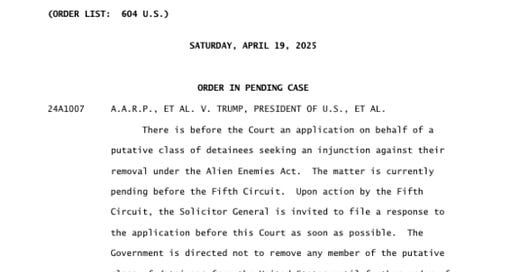Supreme Court Orders Halt to Deportations Under Alien Enemies Act
Court rulings and intelligence findings undermine Trump’s justification for using 18th-century wartime law to deport Venezuelan men without due process.

WASHINGTON, D.C. — The U.S. Supreme Court on Saturday ruled 7-2 to stop the deportations of more than 100 Venezuelan men detained under President Donald Trump’s proclamation invoking the Alien Enemies Act. The order followed an emergency filing and lower court rulings that accused the administration of defying judicial authority and violating due process.
In an unsigned April 19 order in A.A.R.P., et al. v. Trump, the Supreme Court directed the U.S. government “not to remove any member of the putative class of detainees from the United States until further order of this Court.” The Supreme Court also invited the Solicitor General to file a response and acknowledged that the underlying matter is pending before the Fifth Circuit Court of Appeals.
The emergency application was filed by the American Civil Liberties Union (ACLU) on April 18 on behalf of Venezuelan men detained in ICE custody who were facing imminent deportation to El Salvador. The ACLU argued that the government is carrying out removals under the 1798 Alien Enemies Act without providing adequate notice or access to judicial review, in violation of the Constitution and a prior Supreme Court order issued on April 7.
On April 16, U.S. District Judge James Boasberg found probable cause that former President Trump acted in criminal contempt of court by defying the Supreme Court’s April 7 directive in Trump v. J.G.G. to “facilitate” the return of Kilmar Abrego Garcia — a Salvadoran man who had been unlawfully deported in violation of a standing withholding of removal order.
“The Constitution does not tolerate willful disobedience of judicial orders — especially by officials of a coordinate branch who have sworn an oath to uphold it,” Boasberg wrote. “To permit such officials to freely ‘annul the judgments of the courts of the United States’ would not just ‘destroy the rights acquired under those judgments’; it would make ‘a solemn mockery’ of ‘the Constitution itself.’”
In its April 7 order, the Supreme Court also ruled that individuals designated for removal under the Alien Enemies Act must receive timely notice in a language they can understand and have a meaningful opportunity to file habeas corpus petitions before being deported. The justices unanimously affirmed 9-0 that noncitizens in such proceedings are entitled to due process protections.
Despite this, immigration attorneys reported that federal agents continued to issue removal notices in English only, failed to notify legal counsel, and provided little to no time for detainees to challenge their designation. The ACLU argued that dozens, and potentially hundreds, of Venezuelan men had been transferred to the Bluebonnet Detention Facility in Texas, where deportations were being carried out in secret and at high speed.
The ACLU filing emphasized that the government had previously deported 137 Venezuelan men under the AEA proclamation, signed on March 14, and that many of those individuals are now being held indefinitely in El Salvador’s notorious CECOT mega-prison. According to evidence cited in court records, many deportees faced conditions described as “life-threatening,” including torture, denial of medical care, and indefinite confinement.
Meanwhile, new reporting undermines the Trump administration’s public rationale for invoking the Alien Enemies Act in the first place. According to Washington Post reporter Josh Hudson, the National Intelligence Council (NIC) concluded in a secret assessment earlier this month that Venezuela is not directing an invasion of the United States through the gang Tren de Aragua.
“The determination is the U.S. government’s most comprehensive assessment to date undercutting Trump’s rationale for deporting suspected gang members without due process under the Alien Enemies Act,” Hudson reported.
The NIC assessment reportedly found that while there are some low-level contacts between the Maduro regime and Tren de Aragua, the gang does not operate at the direction of the Venezuelan government.
The Supreme Court’s April 19 order to halt all AEA deportations was issued under its authority in the All Writs Act, 28 U.S.C. § 1651(a), which allows the Court to issue injunctions necessary to preserve its jurisdiction. Justices Clarence Thomas and Samuel Alito dissented from the ruling.
In earlier proceedings, the U.S. Court of Appeals for the Fourth Circuit also denied a government request to stay a lower court’s order in the Abrego Garcia case. Judge J. Harvie Wilkinson III rejected the government’s argument that it had no obligation to reverse the wrongful deportation because Garcia was no longer in U.S. custody.
“‘Facilitate’ is an active verb,” Wilkinson wrote. “It requires that steps be taken as the Supreme Court has made perfectly clear… Allowing all this would ‘facilitate’ foreign detention more than it would domestic return.” He added, “The government is asserting a right to stash away residents of this country in foreign prisons without the semblance of due process that is the foundation of our constitutional order.”
The broader legal question — whether a peacetime criminal gang satisfies the statutory predicates of the Alien Enemies Act, which is only supposed to be enacted in times of war — remains unresolved despite NIC findings that Venezuela is not directing an invasion of the United States through Tren de Aragua.
The judiciary has signaled in its April 19 order that even under expansive executive authority, constitutional guarantees of due process cannot be ignored.
Until further rulings are made the Supreme Court’s emergency freeze remains in effect, preserving the detainees’ access to due process and peventing their deportations, for now.



